Legal Analysis: CIF Contract for Olive Oil Sale - Property & Payment
VerifiedAdded on 2023/01/10
|8
|2258
|84
Case Study
AI Summary
This assignment analyzes a case study involving a CIF (Cost, Insurance, and Freight) contract for the sale of 20,000 tons of olive oil. The scenario details a transaction between Dave (seller) and Jane (buyer), where Dave purchases the olive oil afloat on the vessel 'Spirit of the Sea.' The vessel arrives in Livorno before the bill of lading reaches Dave. Jane pressures Dave for delivery, who provides a delivery order. Jane takes possession of the oil, while Dave later receives the bill of lading. The analysis focuses on two key legal questions: (1) Where does the property in the olive oil lie at different stages of the transaction, considering the CIF terms and the timing of the bill of lading? (2) Can Dave sue Jane for payment, given the sequence of events and the absence of payment? The solution explores the passing of risk and property under a CIF contract, referencing relevant case law and legal principles. The document examines the obligations of both buyer and seller and determines the legal recourse available to Dave.
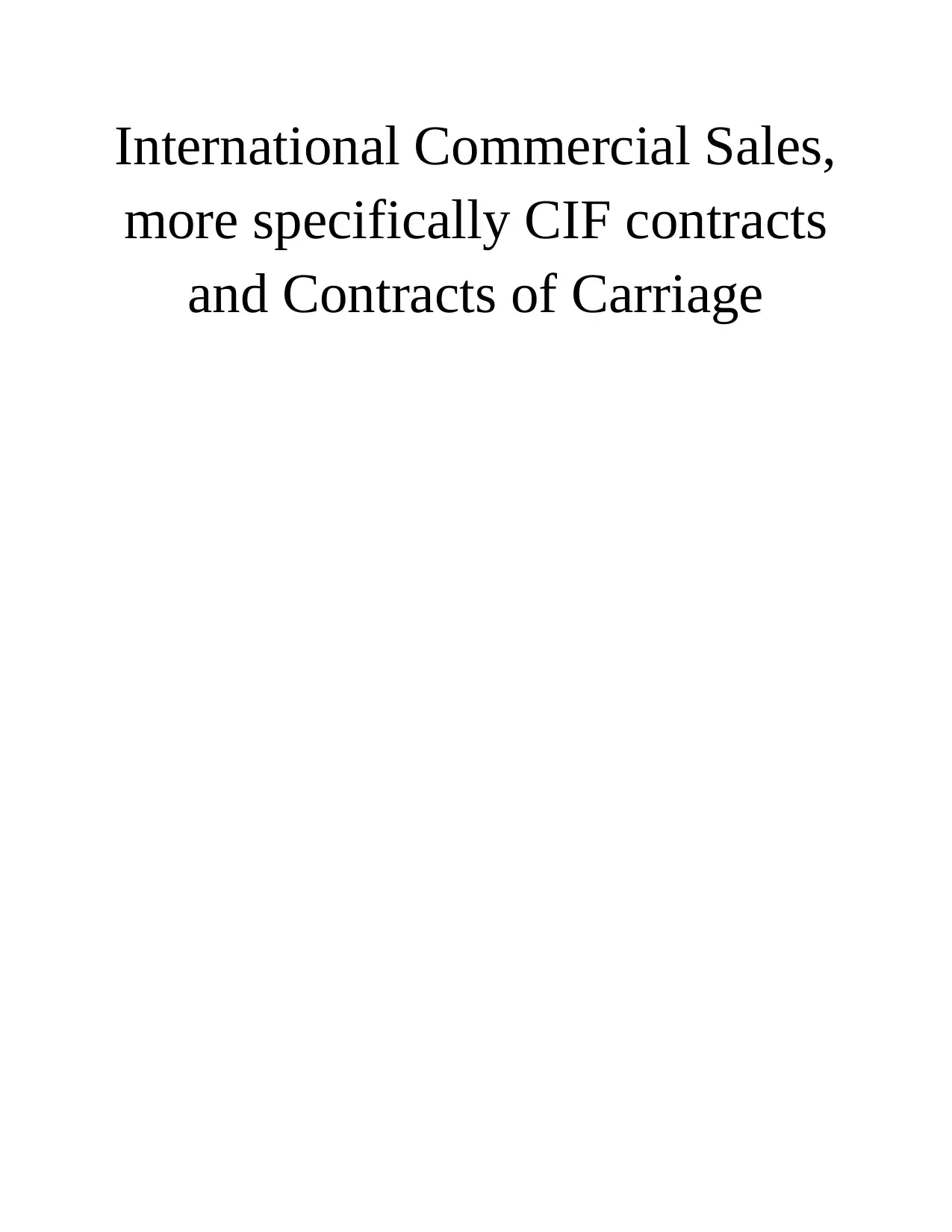
International Commercial Sales,
more specifically CIF contracts
and Contracts of Carriage
more specifically CIF contracts
and Contracts of Carriage
Paraphrase This Document
Need a fresh take? Get an instant paraphrase of this document with our AI Paraphraser
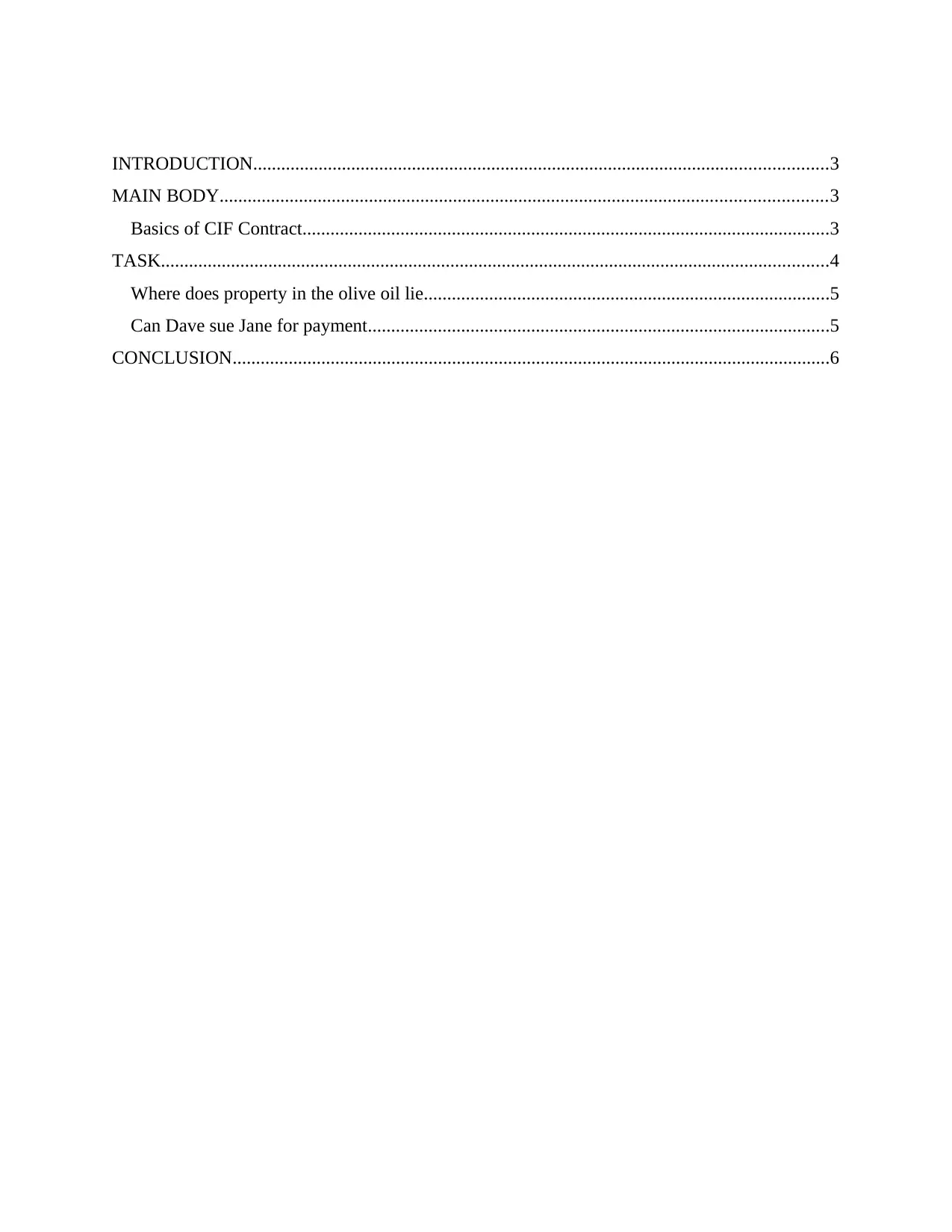
INTRODUCTION...........................................................................................................................3
MAIN BODY..................................................................................................................................3
Basics of CIF Contract.................................................................................................................3
TASK...............................................................................................................................................4
Where does property in the olive oil lie.......................................................................................5
Can Dave sue Jane for payment...................................................................................................5
CONCLUSION................................................................................................................................6
MAIN BODY..................................................................................................................................3
Basics of CIF Contract.................................................................................................................3
TASK...............................................................................................................................................4
Where does property in the olive oil lie.......................................................................................5
Can Dave sue Jane for payment...................................................................................................5
CONCLUSION................................................................................................................................6
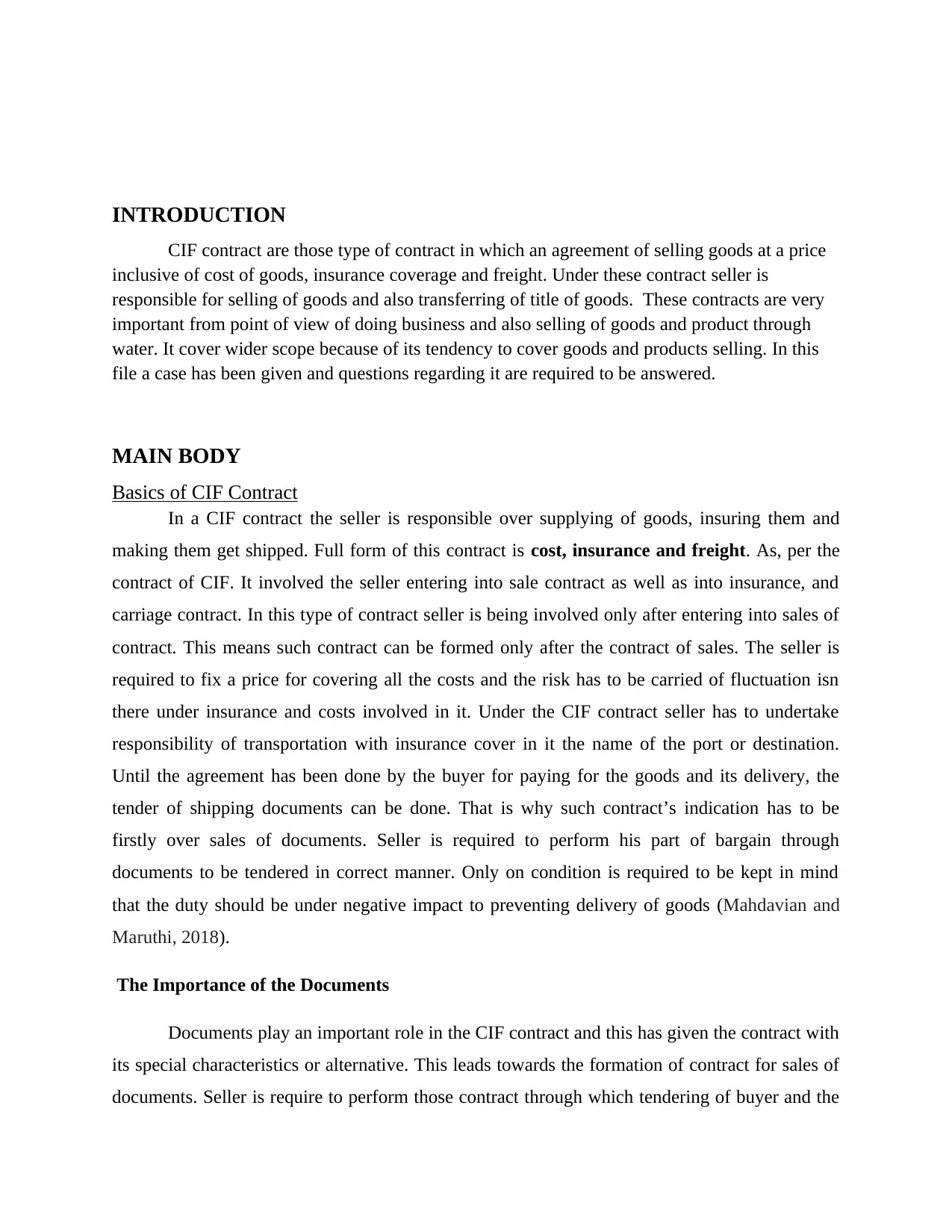
INTRODUCTION
CIF contract are those type of contract in which an agreement of selling goods at a price
inclusive of cost of goods, insurance coverage and freight. Under these contract seller is
responsible for selling of goods and also transferring of title of goods. These contracts are very
important from point of view of doing business and also selling of goods and product through
water. It cover wider scope because of its tendency to cover goods and products selling. In this
file a case has been given and questions regarding it are required to be answered.
MAIN BODY
Basics of CIF Contract
In a CIF contract the seller is responsible over supplying of goods, insuring them and
making them get shipped. Full form of this contract is cost, insurance and freight. As, per the
contract of CIF. It involved the seller entering into sale contract as well as into insurance, and
carriage contract. In this type of contract seller is being involved only after entering into sales of
contract. This means such contract can be formed only after the contract of sales. The seller is
required to fix a price for covering all the costs and the risk has to be carried of fluctuation isn
there under insurance and costs involved in it. Under the CIF contract seller has to undertake
responsibility of transportation with insurance cover in it the name of the port or destination.
Until the agreement has been done by the buyer for paying for the goods and its delivery, the
tender of shipping documents can be done. That is why such contract’s indication has to be
firstly over sales of documents. Seller is required to perform his part of bargain through
documents to be tendered in correct manner. Only on condition is required to be kept in mind
that the duty should be under negative impact to preventing delivery of goods (Mahdavian and
Maruthi, 2018).
The Importance of the Documents
Documents play an important role in the CIF contract and this has given the contract with
its special characteristics or alternative. This leads towards the formation of contract for sales of
documents. Seller is require to perform those contract through which tendering of buyer and the
CIF contract are those type of contract in which an agreement of selling goods at a price
inclusive of cost of goods, insurance coverage and freight. Under these contract seller is
responsible for selling of goods and also transferring of title of goods. These contracts are very
important from point of view of doing business and also selling of goods and product through
water. It cover wider scope because of its tendency to cover goods and products selling. In this
file a case has been given and questions regarding it are required to be answered.
MAIN BODY
Basics of CIF Contract
In a CIF contract the seller is responsible over supplying of goods, insuring them and
making them get shipped. Full form of this contract is cost, insurance and freight. As, per the
contract of CIF. It involved the seller entering into sale contract as well as into insurance, and
carriage contract. In this type of contract seller is being involved only after entering into sales of
contract. This means such contract can be formed only after the contract of sales. The seller is
required to fix a price for covering all the costs and the risk has to be carried of fluctuation isn
there under insurance and costs involved in it. Under the CIF contract seller has to undertake
responsibility of transportation with insurance cover in it the name of the port or destination.
Until the agreement has been done by the buyer for paying for the goods and its delivery, the
tender of shipping documents can be done. That is why such contract’s indication has to be
firstly over sales of documents. Seller is required to perform his part of bargain through
documents to be tendered in correct manner. Only on condition is required to be kept in mind
that the duty should be under negative impact to preventing delivery of goods (Mahdavian and
Maruthi, 2018).
The Importance of the Documents
Documents play an important role in the CIF contract and this has given the contract with
its special characteristics or alternative. This leads towards the formation of contract for sales of
documents. Seller is require to perform those contract through which tendering of buyer and the
⊘ This is a preview!⊘
Do you want full access?
Subscribe today to unlock all pages.

Trusted by 1+ million students worldwide
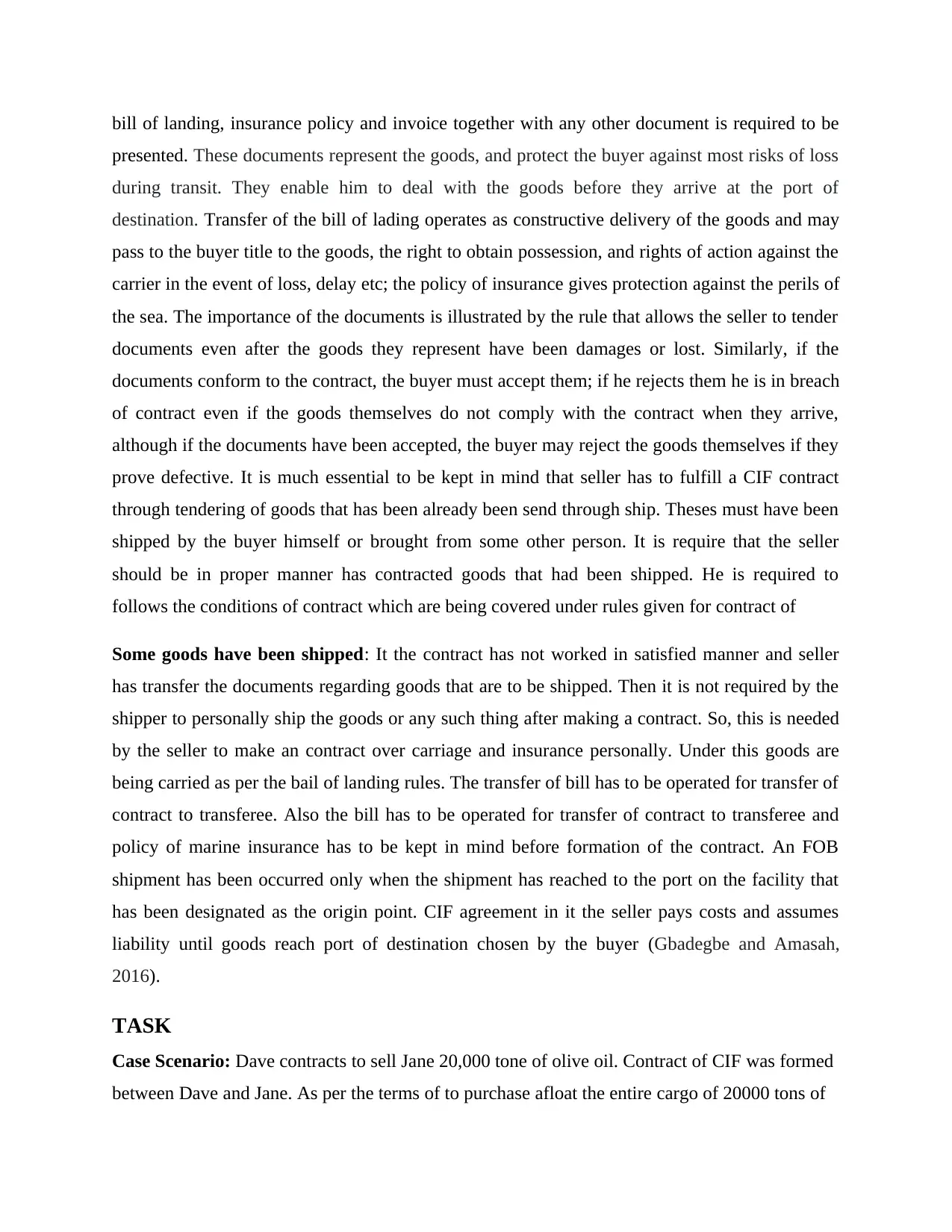
bill of landing, insurance policy and invoice together with any other document is required to be
presented. These documents represent the goods, and protect the buyer against most risks of loss
during transit. They enable him to deal with the goods before they arrive at the port of
destination. Transfer of the bill of lading operates as constructive delivery of the goods and may
pass to the buyer title to the goods, the right to obtain possession, and rights of action against the
carrier in the event of loss, delay etc; the policy of insurance gives protection against the perils of
the sea. The importance of the documents is illustrated by the rule that allows the seller to tender
documents even after the goods they represent have been damages or lost. Similarly, if the
documents conform to the contract, the buyer must accept them; if he rejects them he is in breach
of contract even if the goods themselves do not comply with the contract when they arrive,
although if the documents have been accepted, the buyer may reject the goods themselves if they
prove defective. It is much essential to be kept in mind that seller has to fulfill a CIF contract
through tendering of goods that has been already been send through ship. Theses must have been
shipped by the buyer himself or brought from some other person. It is require that the seller
should be in proper manner has contracted goods that had been shipped. He is required to
follows the conditions of contract which are being covered under rules given for contract of
Some goods have been shipped: It the contract has not worked in satisfied manner and seller
has transfer the documents regarding goods that are to be shipped. Then it is not required by the
shipper to personally ship the goods or any such thing after making a contract. So, this is needed
by the seller to make an contract over carriage and insurance personally. Under this goods are
being carried as per the bail of landing rules. The transfer of bill has to be operated for transfer of
contract to transferee. Also the bill has to be operated for transfer of contract to transferee and
policy of marine insurance has to be kept in mind before formation of the contract. An FOB
shipment has been occurred only when the shipment has reached to the port on the facility that
has been designated as the origin point. CIF agreement in it the seller pays costs and assumes
liability until goods reach port of destination chosen by the buyer (Gbadegbe and Amasah,
2016).
TASK
Case Scenario: Dave contracts to sell Jane 20,000 tone of olive oil. Contract of CIF was formed
between Dave and Jane. As per the terms of to purchase afloat the entire cargo of 20000 tons of
presented. These documents represent the goods, and protect the buyer against most risks of loss
during transit. They enable him to deal with the goods before they arrive at the port of
destination. Transfer of the bill of lading operates as constructive delivery of the goods and may
pass to the buyer title to the goods, the right to obtain possession, and rights of action against the
carrier in the event of loss, delay etc; the policy of insurance gives protection against the perils of
the sea. The importance of the documents is illustrated by the rule that allows the seller to tender
documents even after the goods they represent have been damages or lost. Similarly, if the
documents conform to the contract, the buyer must accept them; if he rejects them he is in breach
of contract even if the goods themselves do not comply with the contract when they arrive,
although if the documents have been accepted, the buyer may reject the goods themselves if they
prove defective. It is much essential to be kept in mind that seller has to fulfill a CIF contract
through tendering of goods that has been already been send through ship. Theses must have been
shipped by the buyer himself or brought from some other person. It is require that the seller
should be in proper manner has contracted goods that had been shipped. He is required to
follows the conditions of contract which are being covered under rules given for contract of
Some goods have been shipped: It the contract has not worked in satisfied manner and seller
has transfer the documents regarding goods that are to be shipped. Then it is not required by the
shipper to personally ship the goods or any such thing after making a contract. So, this is needed
by the seller to make an contract over carriage and insurance personally. Under this goods are
being carried as per the bail of landing rules. The transfer of bill has to be operated for transfer of
contract to transferee. Also the bill has to be operated for transfer of contract to transferee and
policy of marine insurance has to be kept in mind before formation of the contract. An FOB
shipment has been occurred only when the shipment has reached to the port on the facility that
has been designated as the origin point. CIF agreement in it the seller pays costs and assumes
liability until goods reach port of destination chosen by the buyer (Gbadegbe and Amasah,
2016).
TASK
Case Scenario: Dave contracts to sell Jane 20,000 tone of olive oil. Contract of CIF was formed
between Dave and Jane. As per the terms of to purchase afloat the entire cargo of 20000 tons of
Paraphrase This Document
Need a fresh take? Get an instant paraphrase of this document with our AI Paraphraser
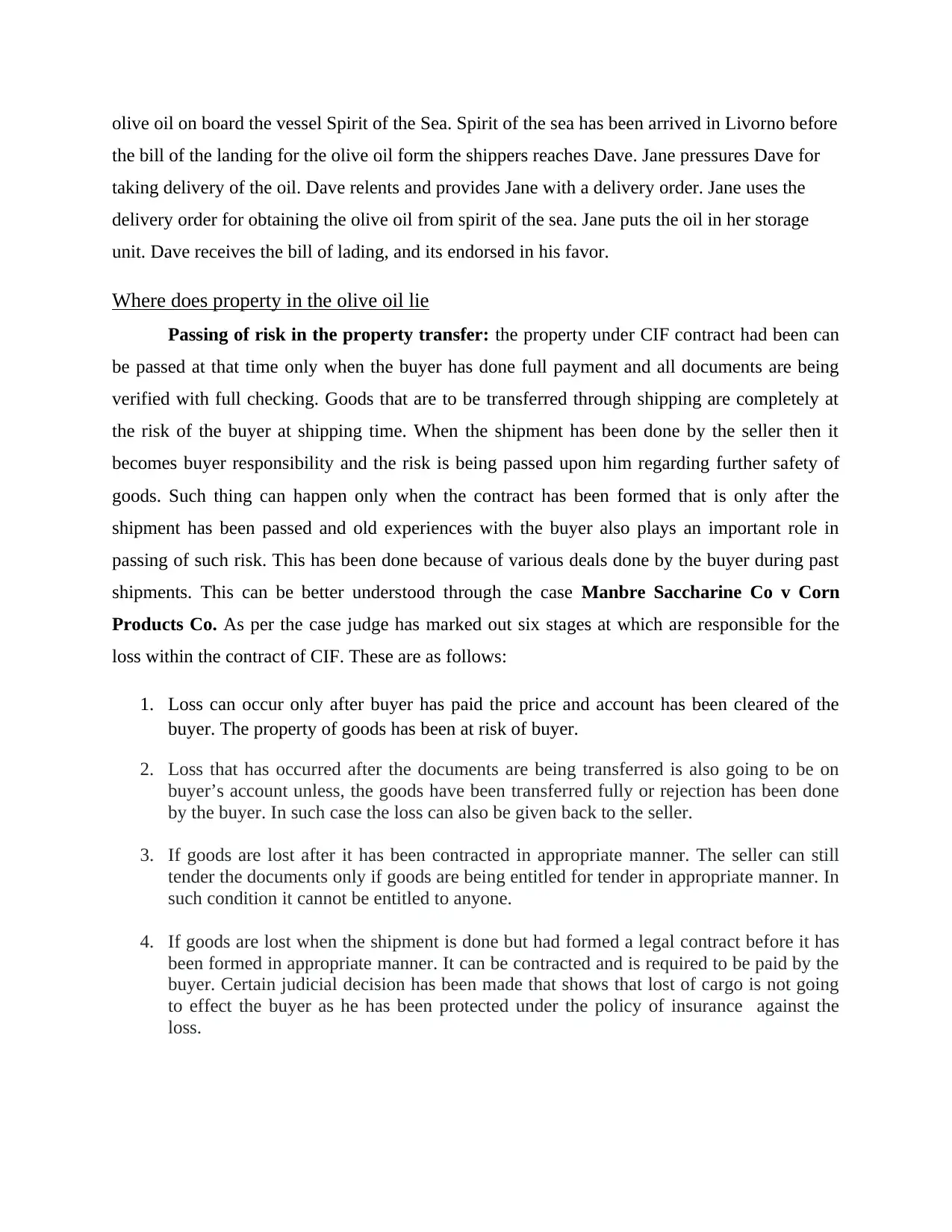
olive oil on board the vessel Spirit of the Sea. Spirit of the sea has been arrived in Livorno before
the bill of the landing for the olive oil form the shippers reaches Dave. Jane pressures Dave for
taking delivery of the oil. Dave relents and provides Jane with a delivery order. Jane uses the
delivery order for obtaining the olive oil from spirit of the sea. Jane puts the oil in her storage
unit. Dave receives the bill of lading, and its endorsed in his favor.
Where does property in the olive oil lie
Passing of risk in the property transfer: the property under CIF contract had been can
be passed at that time only when the buyer has done full payment and all documents are being
verified with full checking. Goods that are to be transferred through shipping are completely at
the risk of the buyer at shipping time. When the shipment has been done by the seller then it
becomes buyer responsibility and the risk is being passed upon him regarding further safety of
goods. Such thing can happen only when the contract has been formed that is only after the
shipment has been passed and old experiences with the buyer also plays an important role in
passing of such risk. This has been done because of various deals done by the buyer during past
shipments. This can be better understood through the case Manbre Saccharine Co v Corn
Products Co. As per the case judge has marked out six stages at which are responsible for the
loss within the contract of CIF. These are as follows:
1. Loss can occur only after buyer has paid the price and account has been cleared of the
buyer. The property of goods has been at risk of buyer.
2. Loss that has occurred after the documents are being transferred is also going to be on
buyer’s account unless, the goods have been transferred fully or rejection has been done
by the buyer. In such case the loss can also be given back to the seller.
3. If goods are lost after it has been contracted in appropriate manner. The seller can still
tender the documents only if goods are being entitled for tender in appropriate manner. In
such condition it cannot be entitled to anyone.
4. If goods are lost when the shipment is done but had formed a legal contract before it has
been formed in appropriate manner. It can be contracted and is required to be paid by the
buyer. Certain judicial decision has been made that shows that lost of cargo is not going
to effect the buyer as he has been protected under the policy of insurance against the
loss.
the bill of the landing for the olive oil form the shippers reaches Dave. Jane pressures Dave for
taking delivery of the oil. Dave relents and provides Jane with a delivery order. Jane uses the
delivery order for obtaining the olive oil from spirit of the sea. Jane puts the oil in her storage
unit. Dave receives the bill of lading, and its endorsed in his favor.
Where does property in the olive oil lie
Passing of risk in the property transfer: the property under CIF contract had been can
be passed at that time only when the buyer has done full payment and all documents are being
verified with full checking. Goods that are to be transferred through shipping are completely at
the risk of the buyer at shipping time. When the shipment has been done by the seller then it
becomes buyer responsibility and the risk is being passed upon him regarding further safety of
goods. Such thing can happen only when the contract has been formed that is only after the
shipment has been passed and old experiences with the buyer also plays an important role in
passing of such risk. This has been done because of various deals done by the buyer during past
shipments. This can be better understood through the case Manbre Saccharine Co v Corn
Products Co. As per the case judge has marked out six stages at which are responsible for the
loss within the contract of CIF. These are as follows:
1. Loss can occur only after buyer has paid the price and account has been cleared of the
buyer. The property of goods has been at risk of buyer.
2. Loss that has occurred after the documents are being transferred is also going to be on
buyer’s account unless, the goods have been transferred fully or rejection has been done
by the buyer. In such case the loss can also be given back to the seller.
3. If goods are lost after it has been contracted in appropriate manner. The seller can still
tender the documents only if goods are being entitled for tender in appropriate manner. In
such condition it cannot be entitled to anyone.
4. If goods are lost when the shipment is done but had formed a legal contract before it has
been formed in appropriate manner. It can be contracted and is required to be paid by the
buyer. Certain judicial decision has been made that shows that lost of cargo is not going
to effect the buyer as he has been protected under the policy of insurance against the
loss.
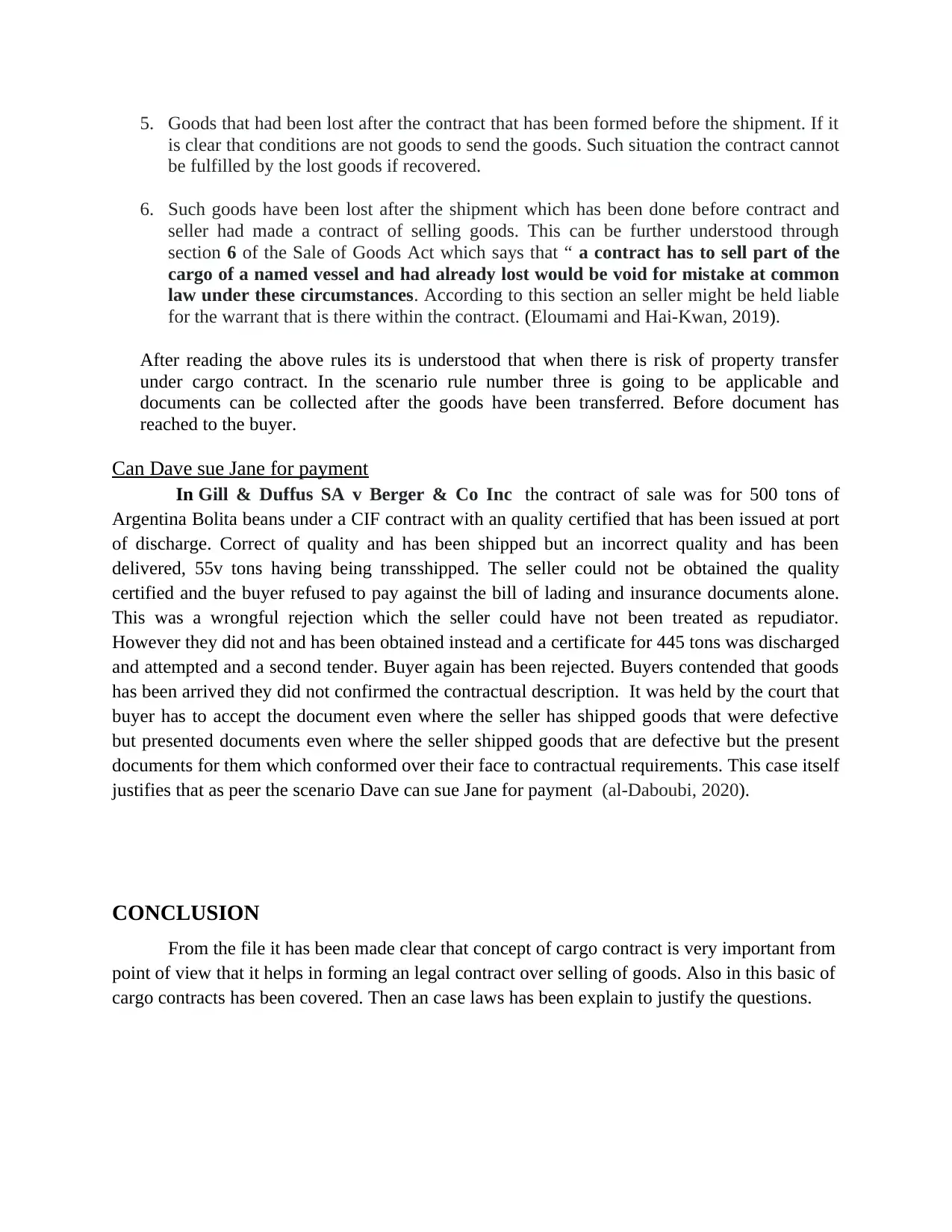
5. Goods that had been lost after the contract that has been formed before the shipment. If it
is clear that conditions are not goods to send the goods. Such situation the contract cannot
be fulfilled by the lost goods if recovered.
6. Such goods have been lost after the shipment which has been done before contract and
seller had made a contract of selling goods. This can be further understood through
section 6 of the Sale of Goods Act which says that “ a contract has to sell part of the
cargo of a named vessel and had already lost would be void for mistake at common
law under these circumstances. According to this section an seller might be held liable
for the warrant that is there within the contract. (Eloumami and Hai-Kwan, 2019).
After reading the above rules its is understood that when there is risk of property transfer
under cargo contract. In the scenario rule number three is going to be applicable and
documents can be collected after the goods have been transferred. Before document has
reached to the buyer.
Can Dave sue Jane for payment
In Gill & Duffus SA v Berger & Co Inc the contract of sale was for 500 tons of
Argentina Bolita beans under a CIF contract with an quality certified that has been issued at port
of discharge. Correct of quality and has been shipped but an incorrect quality and has been
delivered, 55v tons having being transshipped. The seller could not be obtained the quality
certified and the buyer refused to pay against the bill of lading and insurance documents alone.
This was a wrongful rejection which the seller could have not been treated as repudiator.
However they did not and has been obtained instead and a certificate for 445 tons was discharged
and attempted and a second tender. Buyer again has been rejected. Buyers contended that goods
has been arrived they did not confirmed the contractual description. It was held by the court that
buyer has to accept the document even where the seller has shipped goods that were defective
but presented documents even where the seller shipped goods that are defective but the present
documents for them which conformed over their face to contractual requirements. This case itself
justifies that as peer the scenario Dave can sue Jane for payment (al-Daboubi, 2020).
CONCLUSION
From the file it has been made clear that concept of cargo contract is very important from
point of view that it helps in forming an legal contract over selling of goods. Also in this basic of
cargo contracts has been covered. Then an case laws has been explain to justify the questions.
is clear that conditions are not goods to send the goods. Such situation the contract cannot
be fulfilled by the lost goods if recovered.
6. Such goods have been lost after the shipment which has been done before contract and
seller had made a contract of selling goods. This can be further understood through
section 6 of the Sale of Goods Act which says that “ a contract has to sell part of the
cargo of a named vessel and had already lost would be void for mistake at common
law under these circumstances. According to this section an seller might be held liable
for the warrant that is there within the contract. (Eloumami and Hai-Kwan, 2019).
After reading the above rules its is understood that when there is risk of property transfer
under cargo contract. In the scenario rule number three is going to be applicable and
documents can be collected after the goods have been transferred. Before document has
reached to the buyer.
Can Dave sue Jane for payment
In Gill & Duffus SA v Berger & Co Inc the contract of sale was for 500 tons of
Argentina Bolita beans under a CIF contract with an quality certified that has been issued at port
of discharge. Correct of quality and has been shipped but an incorrect quality and has been
delivered, 55v tons having being transshipped. The seller could not be obtained the quality
certified and the buyer refused to pay against the bill of lading and insurance documents alone.
This was a wrongful rejection which the seller could have not been treated as repudiator.
However they did not and has been obtained instead and a certificate for 445 tons was discharged
and attempted and a second tender. Buyer again has been rejected. Buyers contended that goods
has been arrived they did not confirmed the contractual description. It was held by the court that
buyer has to accept the document even where the seller has shipped goods that were defective
but presented documents even where the seller shipped goods that are defective but the present
documents for them which conformed over their face to contractual requirements. This case itself
justifies that as peer the scenario Dave can sue Jane for payment (al-Daboubi, 2020).
CONCLUSION
From the file it has been made clear that concept of cargo contract is very important from
point of view that it helps in forming an legal contract over selling of goods. Also in this basic of
cargo contracts has been covered. Then an case laws has been explain to justify the questions.
⊘ This is a preview!⊘
Do you want full access?
Subscribe today to unlock all pages.

Trusted by 1+ million students worldwide
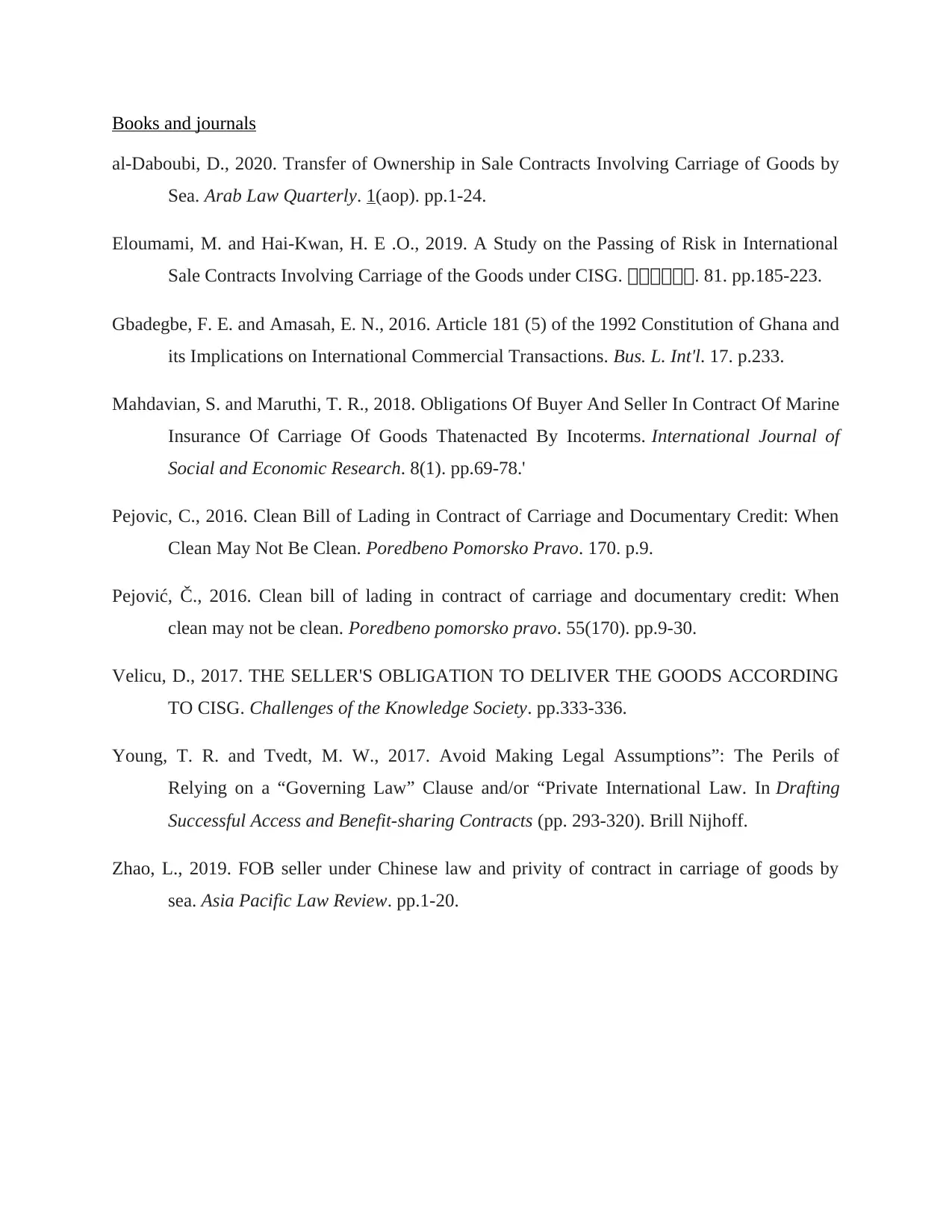
Books and journals
al-Daboubi, D., 2020. Transfer of Ownership in Sale Contracts Involving Carriage of Goods by
Sea. Arab Law Quarterly. 1(aop). pp.1-24.
Eloumami, M. and Hai-Kwan, H. E .O., 2019. A Study on the Passing of Risk in International
Sale Contracts Involving Carriage of the Goods under CISG. 무무무무무무. 81. pp.185-223.
Gbadegbe, F. E. and Amasah, E. N., 2016. Article 181 (5) of the 1992 Constitution of Ghana and
its Implications on International Commercial Transactions. Bus. L. Int'l. 17. p.233.
Mahdavian, S. and Maruthi, T. R., 2018. Obligations Of Buyer And Seller In Contract Of Marine
Insurance Of Carriage Of Goods Thatenacted By Incoterms. International Journal of
Social and Economic Research. 8(1). pp.69-78.'
Pejovic, C., 2016. Clean Bill of Lading in Contract of Carriage and Documentary Credit: When
Clean May Not Be Clean. Poredbeno Pomorsko Pravo. 170. p.9.
Pejović, Č., 2016. Clean bill of lading in contract of carriage and documentary credit: When
clean may not be clean. Poredbeno pomorsko pravo. 55(170). pp.9-30.
Velicu, D., 2017. THE SELLER'S OBLIGATION TO DELIVER THE GOODS ACCORDING
TO CISG. Challenges of the Knowledge Society. pp.333-336.
Young, T. R. and Tvedt, M. W., 2017. Avoid Making Legal Assumptions”: The Perils of
Relying on a “Governing Law” Clause and/or “Private International Law. In Drafting
Successful Access and Benefit-sharing Contracts (pp. 293-320). Brill Nijhoff.
Zhao, L., 2019. FOB seller under Chinese law and privity of contract in carriage of goods by
sea. Asia Pacific Law Review. pp.1-20.
al-Daboubi, D., 2020. Transfer of Ownership in Sale Contracts Involving Carriage of Goods by
Sea. Arab Law Quarterly. 1(aop). pp.1-24.
Eloumami, M. and Hai-Kwan, H. E .O., 2019. A Study on the Passing of Risk in International
Sale Contracts Involving Carriage of the Goods under CISG. 무무무무무무. 81. pp.185-223.
Gbadegbe, F. E. and Amasah, E. N., 2016. Article 181 (5) of the 1992 Constitution of Ghana and
its Implications on International Commercial Transactions. Bus. L. Int'l. 17. p.233.
Mahdavian, S. and Maruthi, T. R., 2018. Obligations Of Buyer And Seller In Contract Of Marine
Insurance Of Carriage Of Goods Thatenacted By Incoterms. International Journal of
Social and Economic Research. 8(1). pp.69-78.'
Pejovic, C., 2016. Clean Bill of Lading in Contract of Carriage and Documentary Credit: When
Clean May Not Be Clean. Poredbeno Pomorsko Pravo. 170. p.9.
Pejović, Č., 2016. Clean bill of lading in contract of carriage and documentary credit: When
clean may not be clean. Poredbeno pomorsko pravo. 55(170). pp.9-30.
Velicu, D., 2017. THE SELLER'S OBLIGATION TO DELIVER THE GOODS ACCORDING
TO CISG. Challenges of the Knowledge Society. pp.333-336.
Young, T. R. and Tvedt, M. W., 2017. Avoid Making Legal Assumptions”: The Perils of
Relying on a “Governing Law” Clause and/or “Private International Law. In Drafting
Successful Access and Benefit-sharing Contracts (pp. 293-320). Brill Nijhoff.
Zhao, L., 2019. FOB seller under Chinese law and privity of contract in carriage of goods by
sea. Asia Pacific Law Review. pp.1-20.
Paraphrase This Document
Need a fresh take? Get an instant paraphrase of this document with our AI Paraphraser

1 out of 8
Related Documents
Your All-in-One AI-Powered Toolkit for Academic Success.
+13062052269
info@desklib.com
Available 24*7 on WhatsApp / Email
![[object Object]](/_next/static/media/star-bottom.7253800d.svg)
Unlock your academic potential
Copyright © 2020–2026 A2Z Services. All Rights Reserved. Developed and managed by ZUCOL.





